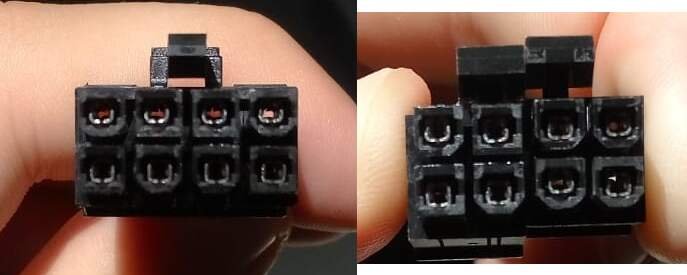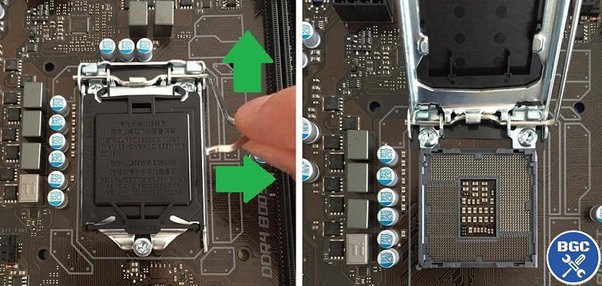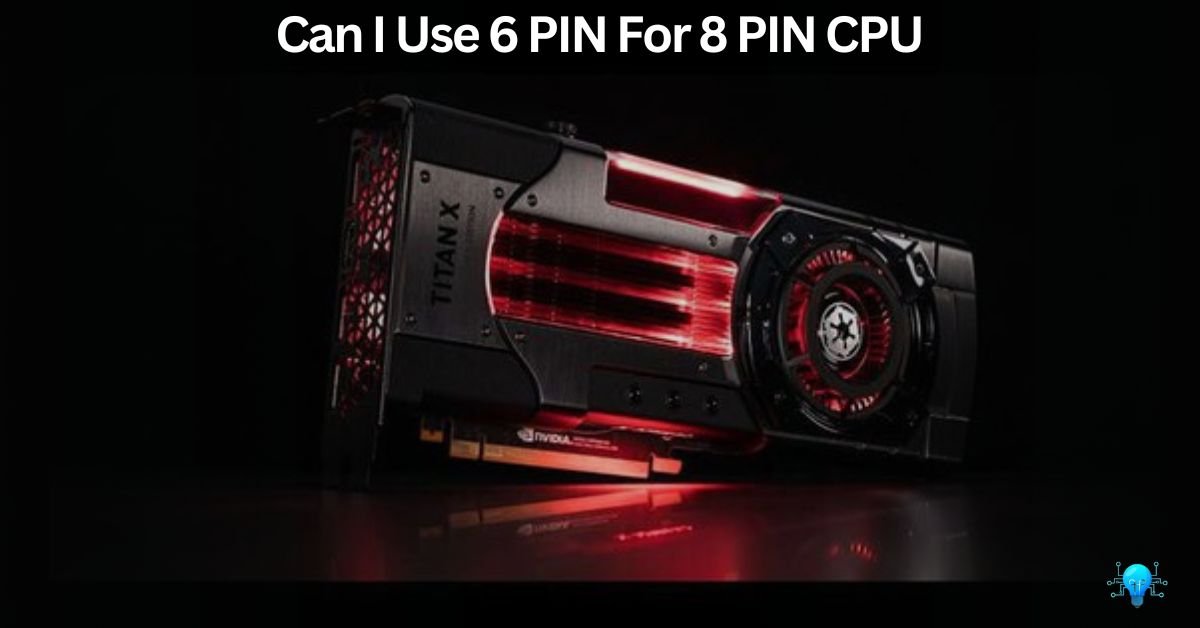I attempted to use a 6 pin connector for my 8 pin CPU, and my computer wouldn’t boot up properly. After struggling with random crashes, I realized my 6-pin connector was the problem.
Using a 6-pin connector for an 8-pin CPU is not recommended. It can cause system instability and potential hardware damage. Always use the correct 8-pin CPU connector for reliable performance.
Stay tuned with us as we talk about “Can I Use a 6-Pin for an 8-Pin CPU?” We’ll cover if it’s safe, the problems it might cause, and the best ways to keep your computer running well. Don’t miss our simple and helpful tips!
What Is An 8-Pin CPU Connector?

An 8-pin CPU connector, also known as EPS12V, is a power connector designed to provide additional power to the CPU in a computer system. It is commonly found on modern motherboards and is essential for delivering stable power to the CPU, especially in high-performance or overclocked systems.
Must Check: Can I Use a CPU Cable For GPU? – Warning!
Digging into the 6-Pin Connector Basics:
A 6-pin connector is a type of power connector commonly found on power supplies, primarily intended for connecting to PCI Express (PCIe) devices such as graphics cards. It consists of a 6-pin connector with an additional 2 pins that can be attached or detached as needed, allowing it to function as either a 6-pin or an 8-pin connector. This flexibility makes it compatible with a variety of PCIe devices that may require different power configurations.
Do You Know? How Much GPU Utilization Is Normal? – Do This Rightly!
Can I Use A 6-Pin For An 8-pin CPU?
Using a 6+2 pin connector for an 8-pin CPU is not recommended. While the physical connection may fit, the power requirements and configurations are different. This mismatch can lead to system crashes or even hardware damage.
It’s best to use the correct 8-pin CPU connector provided by your power supply for optimal performance and safety. For more information about Can I or should I use a 6-pin to 8-pin adapter? you can check out this on Quora.
Why Not Use A 6 Pin For An 8 Pin CPU? – Threats You’ll Have!
Using a 6 pin connector for an 8-pin CPU is not recommended due to several reasons:
Different Purposes: The 8 pin connector is specifically designed to provide stable power to the CPU, while the 6 pin connector is intended for PCI Express (PCIe) devices like graphics cards.
Power Delivery: CPUs require precise and consistent power delivery, which the 8-pin connector is optimized to provide. Using a 6-pin connector may not deliver the necessary power requirements, leading to instability or hardware damage.
Compatibility: Although the physical connection may fit, the pin configuration and voltage requirements may not align correctly, posing risks to the CPU and overall system stability.
In summary, it’s important to use the appropriate connectors to ensure reliable performance and avoid potential damage to your CPU and other components. For more information about using a 6-pin power connector for an 8-pin GPU, you can check out Can I Use a CPU Cable For GPU?
What Happens If I Use The Wrong Connector For My CPU? – Lead To Various Issues!
System Instability: Incorrect power delivery can cause system instability, leading to frequent crashes, freezes, or unexpected shutdowns.
Hardware Damage: Inadequate or improper power delivery can potentially damage the CPU, motherboard, or other components, resulting in costly repairs or replacements.

Reduced Performance: The CPU may not function optimally, leading to decreased performance, slower processing speeds, or difficulties in running demanding tasks or applications.
Warranty Voidance: Using incompatible connectors may void warranties on your CPU, motherboard, or other components, leaving you responsible for any repairs or replacements needed due to damage caused by improper usage.
To prevent these issues, always use the correct connectors as specified by the manufacturer and consult your component manuals for guidance. If you want to know about potential risks during travel or transportation of computer components, including GPUs, you can check out Can I Bring A GPU On A Plane?
Are There Adapters To Convert A 6-Pin To An 8-Pin CPU Connector?

Yes, there are adapters you can use to change a 6-pin connector to an 8-pin CPU connector. But it’s important to know that while these adapters might fit physically, they’re not always the best choice for long-term use. They could make your system unstable or even damage your hardware. It’s usually better to use a power supply that already has the right connectors.
Have You Explored? Torch Is Not Able To Use GPU – A Troubleshooting Guide!
Can Use The Wrong Connector Void My Warranty?
Absolutely Yes, if you use the wrong connector, it could cancel your warranty. Manufacturers usually say which connectors to use in their manuals. So, if you don’t follow their instructions and something goes wrong, your warranty might not cover it. Stick to the manual’s advice to keep your warranty safe and your equipment working well.
Related Post: How Much GPU Should A Game Use? – Discover The Ideal!
How Can I Ensure I Use The Correct Connector For My CPU? – Follow These Steps!
Check the Manual: Refer to the manuals provided with your motherboard and power supply. They will specify which connectors are compatible with your CPU.
Labeling: Look for labels on the connectors themselves. The CPU connector is usually labeled as EPS12V, while PCIe connectors are labelled as such.
Physical Fit: Ensure that the connector physically matches the socket on your motherboard. The CPU connector typically has 8 pins in a specific layout.
Seek Assistance: If you’re unsure, seek guidance from knowledgeable sources such as computer hardware experts or online forums to confirm compatibility and safety.
Interesting Fact:When Does The GPU Fan Turn On – Check Out Our Helpful Guide!
Why Do Modern CPUs Need An 8-pin Connector?
Modern CPUs need an 8-pin connector because they require more power to work well. This connector gives them the stable power they need, especially when they’re doing lots of tasks or when people overclock them to make them faster.
The extra pins also help to make sure the voltage, which is like the electricity, is steady, so the CPU doesn’t get too hot or crash. It’s like giving the CPU the right fuel to run smoothly and stay reliable, even as technology keeps getting better.
In summary, the 8-pin CPU connector is necessary for providing the essential power and stability that modern CPUs require to perform at their best.
Latest Post: Is 74c bad for your GPU – Stay Informed!
What Are The Benefits Of Using The Correct 8-pin CPU Connector?
Using the right 8 pin CPU connector is super important for your computer. It does a few cool things: keeps your computer from crashing, helps it run smoothly when you’re doing lots of stuff, makes sure your CPU lasts a long time, and makes sure everything works together nicely. So, using the right connector is key for keeping your computer happy and healthy!
Never Miss: Can I Use A CPU Cable For GPU – Don’t risk Damaging!
Frequently Asked Questions:
Is it safe to use 6-pin to 8-pin?
Simply put, using a 6+2 pin connector for your GPU isn’t very safe, especially if your card draws a lot of power. However, if you reduce the power limit of your GPU using software like MSI Afterburner, so it stays within the limits of the 6 pin connector, then it’s okay.
Are there any circumstances where a 6+2 pin connector can be used for a CPU?
In general, no. The connectors are designed for different purposes and using a 6+2 pin for a CPU is not recommended due to the risk of instability and damage.
Do I need 2×8 pin for CPU?
You got it! If you don’t have lots of things plugged into your PCI-E slots or you’re not using a really powerful CPU, you probably won’t need to plug in the second 8 pin connector. It’s like having extra power just in case you need it.
Are Dual 6-Pin to 8-Pin Cables Safe?
Yes, dual 6-pin to 8-pin cables can be safe to use, but it’s crucial to ensure they are high-quality and rated for the intended purpose. Be sure to check your components’ power requirements and follow manufacturer guidelines to avoid any potential issues.
Conclusion:
While it may be tempting to use a 6 pin connector for an 8 pin CPU, it’s not recommended due to potential risks of instability and hardware damage. CPUs require stable and precise power delivery, which the correct 8 pin connector provides. Using adapters or alternative connectors can compromise performance and safety.

